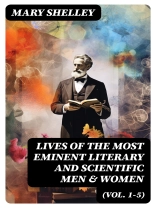Mary Shelley’s ‘Lives of the Most Eminent Literary and Scientific Men & Women (Vol. 1-5)’ is a remarkable exploration of the lives and contributions of pivotal figures in literature and science. With her characteristic Romantic style, Shelley weaves together biographical sketches that highlight the profound impact these individuals had on their respective fields. The work stands out not only for its literary merit but also for its thematic exploration of the interplay between creativity and intellect during an era marked by monumental changes in scientific thought and literary expression. Shelley’s narrative is rich, engaging, and often reflective, inviting readers to consider the complexities of genius and morality in a rapidly evolving world. Mary Shelley, best known for her iconic novel ‘Frankenstein, ‘ was a trailblazer in her own right, deeply immersed in the intellectual currents of the early 19th century. Influenced by her friendships with pioneers like Lord Byron and Percy Bysshe Shelley, her interest in the interplay of literature and science is palpable throughout this series. Her unique perspectives on gender, science, and art lend authenticity and depth to her biographical subjects, drawing upon her extensive literary knowledge and personal experiences. I wholeheartedly recommend Shelley’s ‘Lives of the Most Eminent Literary and Scientific Men & Women’ to anyone interested in the intersection of literature, science, and history. This thought-provoking collection not only honors the legacy of great minds but also encourages contemporary readers to reflect on the enduring significance of their contributions. Shelley’s eloquence and insight make this work an essential addition to the library of any literary scholar or enthusiast.
Giới thiệu về tác giả
Mary Shelley, born Mary Wollstonecraft Godwin on August 30, 1797, in London, England, emerged as an eminent literary figure of the early 19th century. The daughter of the radical political philosopher William Godwin and the pioneering feminist writer Mary Wollstonecraft, Shelley navigated her way through the literary world with a remarkable pedigree. Pioneering the science fiction genre, she is best known for her seminal work ‘Frankenstein, or the Modern Prometheus’ (1818), a profound narrative weaving themes of creation, responsibility, and the nature of humanity. In addition to ‘Frankenstein’, Shelley’s contribution to literature includes ‘The Last Man’ (1826), a foresighted apocalyptic work delving into future, society, and the human condition. Compelled by her profound insight and the era’s ferment, Shelley penned the lesser-known yet significant ‘Lives of the Most Eminent Literary and Scientific Men & Women’ (1835-1839), a five-volume series offering biographical accounts of notable figures, which showcased her scholarly acumen and her reverence for intellectual legacy. Throughout her oeuvre, Shelley’s literary style is reflective of her deep intellectual and emotional ponderings, marked by gothic and romantic elements intertwined with a fascination for science and philosophy. Her work not only illuminates her erudition but also perpetuates her mother’s feminist legacy by underscoring the power and potential of women in the literary and intellectual arenas. Mary Shelley passed away on February 1, 1851, but her indelible impact continues to be felt in literature and beyond.












